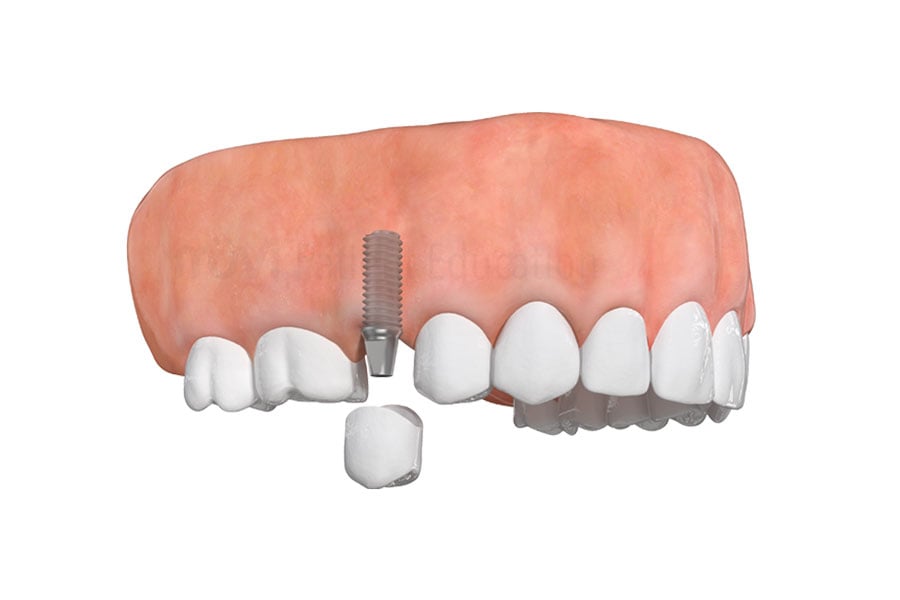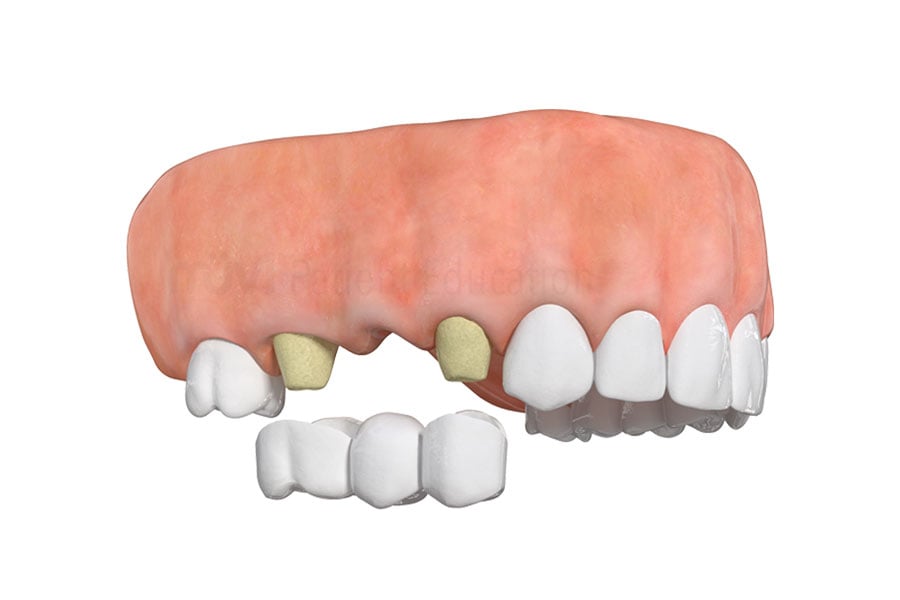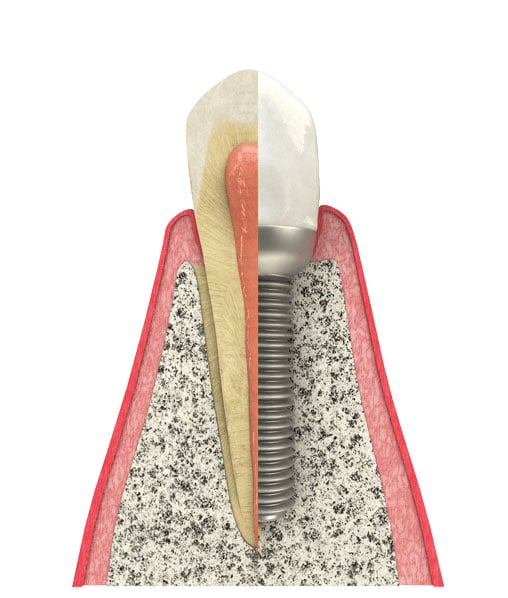
How Does the Dental Implant Procedure Work?
First, your dentist will take x-rays of your mouth and determine the optimal dental implant treatment. Once the implant is placed and ready to be restored, your new beautiful tooth will be attached to it. Since every patient is different, your dental implant treatment will be customized to your exact needs. If you believe you can benefit from a dental implant procedure or would like more information, schedule an appointment here. Your dental team is always happy to answer any questions you may have about the procedure.
Watch to Learn More About the Process
Dental Implant

Traditional Bridge

Dental Implant vs. Traditional Bridge
Today, dental implants are considered the gold standard when replacing missing teeth. They provide several advantages over other replacement options. They not only replace a missing tooth, but also preserve the health of the remaining teeth around it. Implants also help prevent bone loss by stimulating it and keeping it functional and healthy.
Dental bridges, have no component that serves the function of the tooth root, therefore there is no artificial anchor to to attached the new tooth. Because of that, bridges require filing down the neighboring teeth so they can prepared to support the bridge.
Also, since the bone is not stimulated at the site of the tooth loss, they don’t prevent bone loss. Sometimes the anchoring teeth are damaged or lost and the bridge fails. A dental implant will not only look, function and feel just like your missing tooth, but it will also preserve the health of your mouth for many years.

Key Benefits of Dental Implants:
- Looks, Feels, & Functions Like Real Teeth
- Stays in Your Mouth
- Lasts a Lifetime
Your dental implant will feel and function exactly like your natural teeth. You will be able to eat any foods without restrictions. Your new tooth will be virtually indistinguishable from your real teeth, so you can smile again with confidence.
Since the implant is placed in your mouth, it stays in place throughout any activity. There are no eating restrictions or worrying about a false tooth slipping out of place.
Unlike other tooth replacement options, dental implants keep the structure of your jaw intact, so you won’t have to get them refitted or replaced. With good oral hygiene, they will last your entire life.
Frequently Asked Questions
What are dental implants?
Dental implants are artificial tooth roots, usually made of titanium, surgically placed into the jawbone to support crowns, bridges, or dentures, offering a long-term solution for missing teeth.
What is the average cost of a set of permament dental implants?
Price depends on insurance coverage. Uppon consultation only.
What conditions are treated with dental implants?
Dental implants treat tooth loss due to decay, injury, gum disease, or failed root canals. They help restore chewing, speech, and appearance.
How common are dental implants?
Dental implants are increasingly common, with over 3 million Americans having them, and that number grows by about 500,000 each year.
What is the process of getting a dental implant?
The process includes evaluation, implant placement into the jawbone, healing (3–6 months), and placement of an abutment and crown to complete the restoration.
How painful is getting a dental implant?
During surgery, anesthesia prevents pain. Mild swelling or soreness is common afterward, usually manageable with over-the-counter pain relievers and subsides in a few days. Please consult your doctor if the pain gets severe or lasts longer than a week.
What are the benefits of dental implants?
They look and function like real teeth, prevent bone loss, improve speech and chewing, and are more durable and comfortable than bridges or dentures.
What are the risks or complications of dental implants?
Risks include infection, implant failure, nerve damage, or sinus issues. These are rare and often avoidable with proper care and skilled placement.
How long does it take to recover after dental implants?
Initial healing takes a few days to a week, but full integration with the jawbone (osseointegration) can take 3 to 6 months.
How long do dental implants last?
With good oral hygiene and regular maintenance, implants can last 15 to 20 years or more.
When should I call my dentist?
Call your dentist if you experience persistent pain, swelling, bleeding, fever, or if the implant feels loose or shifts in any way.
At what age should you not consider dental implants?
Dental implants are usually not recommended for those under 18, as jawbones must fully develop.
Who shouldn’t get dental implants?
People with uncontrolled diabetes, heavy smokers, or severe bone loss may not be good candidates unless conditions are managed or additional treatments are done.

